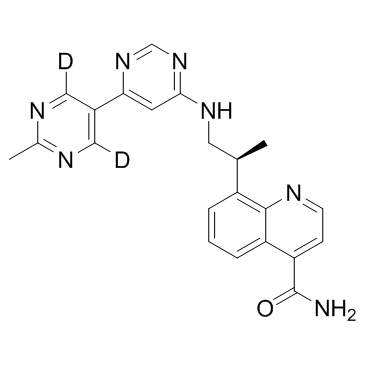| Description |
VX-984 (M9831) is a selective DNA-dependent protein kinase (DNA-PK) inhibitor with IC50 of 88±64 nM for A549 lung cancer cells.
|
| Related Catalog |
|
| Target |
IC50: 88±64 nM (DNA-PK, A549 lung cancer cells)[1].
|
| In Vitro |
VX-984 enhances the radiosensitivity of glioblastoma (GBM) cells grow in vitro. VX-984 effects on radiation-induced DNA-PKcs phosphorylation in U251 cells, a long established GBM cell line, and NSC11, a primary GBM stem-like cell line (GSC). When VX-984 is delivered 1h before irradiation there is a concentration dependent decrease in radiation induced DNA-PKcs phosphorylation in each glioma line [2].
|
| In Vivo |
Treatment of mice with VX-984 inhibites radiation-induced DNA-PKcs phosphorylation in orthotopic brain tumor xenografts, indicating that this compound crosses the blood-brain tumor barrier at sufficient concentrations. For mice bearing U251 or NSC11 brain tumors VX-984 treatment alone has no significant effect on overall survival; radiation alone increases survival. These results indicate that VX-984 enhances the radiosensitivity of brain tumor xenografts and suggest that it may be of benefit in the therapeutic management of GBM [2].
|
| Cell Assay |
U251 cells growing in monolayer are disaggregated into a single cell suspension and seeded onto tissue culture plates. NSC11 CD133+ neurospheres are disaggregated into single cells and seeded onto tissue culture plates coated with poly-L-lysine (Invitrogen) as previously described, which allows for adherent colony formation. To evaluate radiosensitivity, cells are plated at clonal density in six-well plates and irradiated the next day. 10 to 18d after irradiation, plates are stained with 0.5% crystal violet, the number of colonies determined, and the surviving fractions are calculated. Radiation survival curves are generated after normalizing for the cytotoxicity induced by VX-984 (100 nM,250 nM), respectively[2].
|
| Animal Admin |
U251 (2.5×105) cells or CD133+ NSC11 cells (1.0×105),transduces to express luciferase and GFP with the lentivirus LVpFUGQ-UbC-ffLuc2-eGFP2 are intracranially implanted into the right striatum of 6-8-week-old athymic female nude mice. VX-984 (100 mg/kg) is delivered by oral gavage at 1 or 4 h prior to irradiation; 1 h after irradiation tumors are harvested and subjected to immunoblot analysis[2].
|
| References |
[1]. Harnor SJ, et al. Targeting DNA-Dependent Protein Kinase for Cancer Therapy. ChemMedChem. 2017 Jun 21; 12(12):895-900. [2]. Timme CR, et al. The DNA-PK inhibitor VX-984 enhances the radiosensitivity of glioblastoma cells grown in vitro and as orthotopic xenografts. Rath BH, O'Neill JW, Camphausen K, Tofilon PJ. Mol Cancer Ther. 2018 Jun; 17(6):1207-1216.
|
